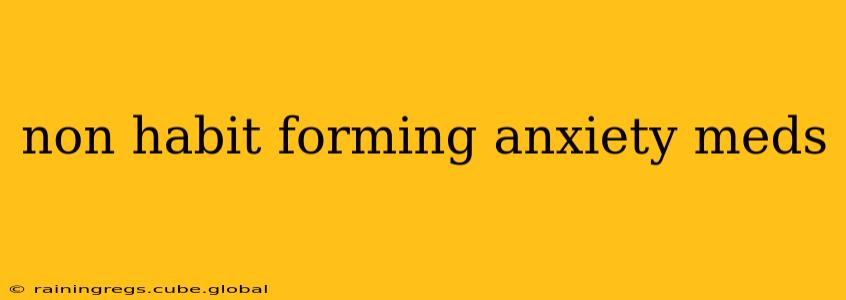Anxiety disorders affect millions, and finding the right treatment is crucial. While many medications offer relief, the potential for dependence is a significant concern for many individuals. This comprehensive guide explores non-habit-forming anxiety medications, addressing common questions and providing valuable information for informed decision-making. It's important to remember that this information is for educational purposes only and should not be considered medical advice. Always consult with your doctor or a qualified healthcare professional before starting any new medication or changing your current treatment plan.
What are Non-Habit-Forming Anxiety Medications?
The term "non-habit-forming" isn't absolute. All medications carry some risk of dependence, although some are significantly less likely to cause physical dependence than others. Generally, medications considered less habit-forming for anxiety tend to fall into categories with different mechanisms of action compared to benzodiazepines, which are known for their potential for dependence. These alternatives often target specific neurotransmitters involved in anxiety, offering relief without the same risk of withdrawal symptoms.
What Medications are Considered Non-Habit-Forming for Anxiety?
Several medication classes are often cited as being less likely to cause physical dependence than benzodiazepines:
-
Buspirone (Buspar): This medication works differently than benzodiazepines, affecting serotonin and dopamine neurotransmitters. It's often praised for its lower potential for dependence and is commonly used for generalized anxiety disorder (GAD). However, it can take several weeks to become fully effective.
-
Certain Antidepressants: Several antidepressants are effective in treating anxiety, even though they're primarily prescribed for depression. These include:
- Selective Serotonin Reuptake Inhibitors (SSRIs): Examples include sertraline (Zoloft), paroxetine (Paxil), escitalopram (Lexapro), and fluoxetine (Prozac). SSRIs are generally considered less habit-forming than benzodiazepines.
- Serotonin-Norepinephrine Reuptake Inhibitors (SNRIs): Examples include venlafaxine (Effexor) and duloxetine (Cymbalta). Like SSRIs, SNRIs are also considered to have a lower risk of dependence.
-
Beta-blockers: While primarily used to treat high blood pressure and other cardiovascular conditions, certain beta-blockers can be helpful in managing performance anxiety, reducing physical symptoms like rapid heart rate and trembling. However, they don't address the underlying psychological aspects of anxiety.
How Do Non-Habit-Forming Anxiety Medications Work?
The mechanism of action varies depending on the medication. However, generally, they work by influencing the balance of neurotransmitters in the brain, such as serotonin, dopamine, and norepinephrine. These neurotransmitters play crucial roles in regulating mood, emotions, and stress responses. By modulating these neurotransmitters, these medications help reduce anxiety symptoms.
Are there any natural or herbal remedies for anxiety?
Several natural and herbal remedies are often touted for anxiety relief, including chamomile tea, valerian root, and ashwagandha. However, scientific evidence supporting their effectiveness is often limited or inconclusive. It's crucial to speak with your doctor before using any herbal remedies, especially if you're taking other medications, as interactions can occur.
What are the side effects of non-habit-forming anxiety medications?
Like all medications, non-habit-forming anxiety medications can have side effects. These can vary widely depending on the individual and the specific medication. Common side effects can include nausea, headache, dizziness, sleep disturbances, and changes in appetite or weight. More serious side effects are possible, albeit rare. It's essential to discuss potential side effects with your doctor.
How long does it take for non-habit-forming anxiety medications to work?
The onset of action varies significantly depending on the medication. Some medications, like buspirone, may take several weeks to reach full effectiveness. Others may offer more immediate relief, but it’s still crucial to be patient and work closely with your doctor.
Can I stop taking non-habit-forming anxiety medications suddenly?
While less likely to cause severe withdrawal compared to benzodiazepines, abruptly stopping any medication, even those considered non-habit-forming, isn't advisable. Always consult your doctor before making any changes to your medication regimen. They can help you gradually reduce your dosage to minimize any potential discomfort or withdrawal symptoms.
This information is for educational purposes only. Always seek professional medical advice before starting any new treatment or altering your existing medical plan. A healthcare professional can accurately diagnose your condition, consider your individual needs and health history, and recommend the most appropriate course of action.
